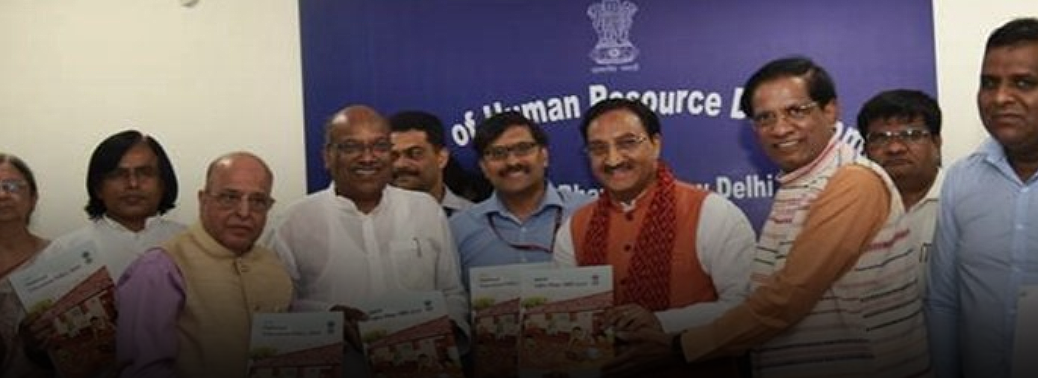DRAFT NATIONAL EDUCATION POLICY PROPOSES FORMAL EDUCATION FROM AGE OF THREE
09, Jun 2019

Prelims level : Governance
Mains level : GS-II Governance, Social Justice and IR
Why in News:
- Three years of preschool and four-year undergraduate honours courses are among features of a draft National Education Policy that the Narendra Modi government received on the first day of its second innings.
Background: / What is the new education policy for?
- The extant National Policy on Education, 1986 modified in 1992 required changes to meet the contemporary and futuristic needs of India’s large youth population.
- A New Education Policy is designed to meet the changing dynamics of the requirements in terms of quality education, innovation and research.
- The policy aims at making India a knowledge superpower by equipping students with the necessary skills and knowledge.
- It also focusses on eliminating the shortage of manpower in science, technology, academics and industry.
- The Draft Policy is built on the foundational pillars of Access, Equity, Quality, Affordability and Accountability.
What are the Key Changes Proposed?
- Ministry – The committee has proposed to rename the Ministry of Human Resource Development as Ministry of Education (MoE).
- Curriculum – In school education, a major reconfiguration of curricular and pedagogical structure was proposed.
- The policy calls for an Early Childhood Care and Education (ECCE) as an integral part of school education.
- A 5+3+3+4 curricular and pedagogical structure based on cognitive and socio-emotional developmental stages of children was proposed.
- It consists of –
- Foundational Stage (age 3-8 yrs): 3 years of pre-primary plus Grades 1-2
- Preparatory Stage (8-11 years): Grades 3-5
- Middle Stage (11-14 years): Grades 6-8
- Secondary Stage (14-18 years): Grades 9-12
- The policy also seeks to reduce content load in school education curriculum.
- There will be no hard separation of learning areas in terms of curricular, co-curricular or extra- curricular areas.
- All subjects, including arts, music, crafts, sports, yoga, community service, etc will be part of the curricular.
- Thus, schools will be re-organized into school complexes.
- The policy promotes active pedagogy to focus on the development of core capacities and life skills, including 21st century skills.
- RTE Act – The committee recommends Extension of Right to Education Act 2009 to cover children of ages 3 to 18 (currently, 6-14).
- Teacher education – The committee proposes for massive transformation in teacher education.
- It calls for shutting down sub-standard teacher education institutions.
- It proposes moving all teacher preparation/education programmes into large multidisciplinary universities/colleges.
The 4-year integrated stage-specific B.Ed. programme will eventually be the minimum degree qualification for teachers. - Higher education – A restructuring of higher education institutions with three types of higher education institutions was proposed –
- Type 1: Focused on world-class research and high-quality teaching
- Type 2: Focused on high quality teaching across disciplines with significant contribution to research
- Type 3: High quality teaching focused on undergraduate education
- This will be driven by two Missions -Mission Nalanda & Mission Takshashila.
- There will be re-structuring of Undergraduate programs such as BSc, BA, BCom, BVoc of 3- or 4-years duration and having multiple exit and entry options.
- Institution – A new apex body Rashtriya Shiksha Ayog is proposed.
- This is to enable a holistic and integrated implementation of all educational initiatives and programmatic interventions.
- The body will also coordinate efforts between the Centre and states.
- The National Research Foundation, an apex body, is proposed for creating a strong research culture.
- It will help build research capacity across higher education.
- The four functions of Standard Setting, Funding, Accreditation and Regulation will be separated and conducted by independent bodies.
- National Higher Education Regulatory Authority will be the only regulator for all higher education including professional education.
- The policy proposes to create an accreditation eco-system led by a revamped NAAC (National Assessment and Accreditation Council).
- Professional Standard Setting Bodies for each area of professional education was proposed.
- UGC is to be transformed to Higher Education Grants Commission (HEGC).
- The private and public institutions will be treated on par, and education will remain a ‘not for profit’ activity.
- Besides the above, the committee also recommended several new policy initiatives for – promoting internationalization of higher education
strengthening quality open and distance learning technology integration at all levels of education facilitating adult and lifelong learning
enhancing participation of under-represented groups - eliminating gender, social category and regional gaps in education outcomes
- Language – Promotion of Indian and classical languages and setting up three new National Institutes for Pali, Persian and Prakrit were proposed.
- Indian Institute of Translation and Interpretation (IITI) has been recommended.
- The policy called for the proper implementation of the three-language formula (dating back to 1968) in schools across the country.
- Accordingly, students in Hindi-speaking states should learn a modern Indian language, apart from Hindi and English. In non-Hindi-speaking states, students will have to learn Hindi along with the regional language and English.
- The controversial three language provision was, however, dropped after protests against it in many states. The draft was revised by the committee making the changes in this regard.






